- Home
- Steven Brust
Hawk (Vlad) Page 18
Hawk (Vlad) Read online
Page 18
The weapon up my left sleeve was about my favorite for this sort of work: a long, slim stiletto. Remember when I was talking about how hard it is to kill someone with a stab wound? Well, it’s another matter if you know how—if you can get to the guy’s heart in one shot like the guy who nailed Kragar did; or get to his brain in one shot, like I can.
I drew the knife and studied it, then swore under my breath because I hadn’t coated it with anything to reduce the glare. I resheathed it. Then I realized that getting him in one shot was unlikely. I just didn’t have the level of detail I usually need to be able to find an exact place, an exact angle of attack. Too much was unknown. I didn’t know if there would still be daylight when he showed, and, if not, what the lighting around here would be like. I knew almost nothing. The idea of taking him with one perfect shot went from seeming unworkable, to plain ridiculous. I was going to take this on like an Orca thug earning ten imperials from a guy he met over wine at a dockside tavern.
Well, all right then. I did have some advantages over the hypothetical Orca thug: Loiosh, Rocza, knowledge of my target, and the fact that I was much, much better than any of them were.
I looked around, considering.
The thing about merchants—even those at the upper end of the class—is that they’re predictable. If they don’t live behind or above their shop—which most of them do—then they get done with work around six hours after noon, go home, and usually stay there. Sounds dull to me, but I guess they like it. And this was an area with a lot of merchants, which means by the time darkness began to fall, the street was nearly empty. Other than really, really crowded, empty is best for my business.
The night descended gradually. The weather was cold but muggy—a trick Adrilankha would pull every once in a while. I drew my cloak around me to warm up, then started sweating. I was beginning to develop a bad mood. I hoped killing Terion would help. Killing someone doesn’t usually put me in a good mood. The set-up and planning do though, so that’s something. As for the killing, well, it doesn’t usually seem to affect my mood at all. Maybe this time would be different. I hoped so.
“Boss, when have you been so worried about mood? Who are you turning into, and how do I stop it?”
“If I can pull this thing off, that should fix it.”
“Yeah, and if you can’t, it won’t matter.”
“I was about to say that.”
Adrilankha hissed, moaned, thudded, and murmured around me, and I waited.
You know, with all its ugliness and stench and irritations, I really love this city.
A wind came up and my hair got in my eyes; something else I’d forgotten. I tied it back. What else had I forgotten? Rocza settled back on my left shoulder.
This guy, Terion, had annoyed me for a long time. Also scared me, and hurt me. I wanted him gone. And now he’d tried to put a shine on Kragar. That I wanted him dead didn’t mean I was any more prepared to kill him; that I wasn’t really prepared to kill him didn’t mean that I didn’t want him dead. Like that.
Time dragged just like it does—did—for a more standard job, like the kind I used to do and get paid for, when I was living a life that, in retrospect, seems simpler, even though it didn’t seem simple at the time and there was probably not much difference. But waiting was part of the job; you even factored it in. As the waiting time expired, as you got close to the moment to move, you got a little more excited, and a little calmer at the same time—everything got sharper and cleaner, and when it came you were utterly and completely ready. Back then, I’d never work with a three-hour window; I’d find another time, another place, another way.
I wiped the sweat from my palms.
I considered a stiletto again, but then rejected it and drew my rapier. This was not going to be clean. And making sure he couldn’t be revivified might involve severing his spine; that wouldn’t be clean either.
I kept the rapier down by my side.
Terion showed up a few minutes before the eighth hour, as near as I can tell. He was flanked by a couple of toughs, who seemed to be doing their job.
“All right, go,” I said, and Loiosh and Rocza left my shoulders. I remember distinctly feeling the wind from their wings on my ears as they flew toward the target.
And now I’d learn if Terion had been set up, or I had.
Turned out he had, and all was well.
Is that too perfunctory? Do you want to know what went down? I don’t want to tell you. It wasn’t pretty, it wasn’t elegant, and it wasn’t clean. It wasn’t like all of those times when the set-up was prearranged and perfect, with nothing left to chance. It wasn’t like that at all.
I’ll tell you, if it helps you sleep nights, that as soon as Loiosh and Rocza appeared, one of the bodyguards screamed and ran and that the other stepped back out of the way, so Loiosh and Rocza were able to concentrate on Terion, whom I caught completely off-guard. He never had a chance. But it still wasn’t clean.
He recognized me, and when the killing blow hit, he looked surprised.
Here’s a thing, if you’re taking notes: One indicator of how well you’ve done your “work” is the amount of blood on you when it’s over. If you do it right—one thrust straight into the eye is my favorite—you’ll hardly end up with a drop on your hand, because avoiding it is part of the planning. That’s important, because in case you get stopped on your way back from committing an antisocial act, the lack of blood might be enough for the Phoenix Guard to overlook you.
But sloppy work is, well, sloppy.
And this was sloppy.
When it was over, I didn’t hang around. I cleaned the blood from my rapier on my own cloak, because why not at that point. I kept the weapon with me, too; he had a weapon out, and if this was investigated and my name came up, I’d be able to make a case for defending myself.
I hugged walls and I used alleys. I hardly passed anyone, and none of them looked at me. Loiosh was quiet. I reached the secret entrance to Kragar’s office. I went past my old lab, and up the stairs, and into the room where I was staying. I realized that I was shaking with exhaustion.
Deragar came in and looked me over. I leaned against the back wall.
He said, “Where do you get your clothes?”
I became aware that all I had with me were some extra-warm things that would make me miserable in Adrilankha, so I told him. He asked for my measurements and I told him what I remembered, and I gave him an imperial. He nodded, and headed out. I’d never cleaned the blood off my boots, which was just as well, as I’d just have to do it again anyway.
I slumped down onto the floor.
“You all right, Boss?”
“Not sure.”
“You should eat something.”
“My stomach wouldn’t hold it. In a bit.”
Terion was gone. Just like that. The guy who’d been tormenting me for so long was now a useless pile of meat and bone. I wasn’t sorry; I mean, of the things I was feeling, regret was so far away from any of them that you couldn’t find a rider to carry a message there. But it felt odd. It felt like it should somehow have been harder, or more significant. I tried to figure out why I felt that way, and it hit me that this had never happened before. That is, I’ve never gone after someone because I wanted him dead. I’d killed cold because I was paid to; I’d killed hot because I was furious; I’d killed desperate because I was attacked. But I’d never just gone after someone for personal reasons, set him up, killed him.
Laris, for all I’d hated him, had forced it on me. Mellar, who had maybe come closer than anyone else to finalizing me, had been “work.” And Loraan had first been an accidental casualty, then had come after me. Ishtvan forced it on me. Boralinoi was going after Cawti.
And so on.
It was strange.
I closed my eyes, took a deep breath, opened them, and noticed there was something neatly folded in the corner: the cloak of Jhereg gray Morrolan had given me. And sitting on top of it was a small box that held a ring and a hawk’s
egg and an enchanted lockpick. Yeah, things were coming together.
“Okay, Boss. Now what?”
My heart gave a little thump as I realized I was actually starting to get close to what I needed.
“Now I wait for clean clothes, because standing around in this is making me crazy.”
“Actually—”
“Shut up, Loiosh.”
I went out and found a closet that, years before, had held what I needed next; I was pleased to find it still did, all together in the same metal box I had always kept it in. I brought the box back to what I was now thinking of as my room. I took out what I needed, and carefully went to cleaning the blood off my boots.
My mind wandered while I worked, but nowhere that matters, and nowhere I want you to go with me. By the time my boots were clean, I was a little more settled down and ready for what came next.
“What comes now, Boss?”
“A nap.”
I never quite fell asleep, but it did feel good. I’d been resting less than an hour when Deragar came back with trousers and a shirt that didn’t have blood all over them. I changed, and managed to make them fit well enough.
“What next?” he said.
“Hang around for a bit. I’ll have another errand.”
“Oh, good,” he said, and left me alone.
I looked at the stuff he’d gotten me. A bit more stylish than I was used to, with black seams on the trousers and a hint of ruffle at the sleeves, but I didn’t mind. I spent some time transferring my hardware. If you’re good at concealing things about your person, you can not only get at what you need quickly, but they don’t feel as heavy as they should. I used to be good at it.
I tried a few draws with this and that, made sure I remembered where that and this were, and nodded. “All right, buddy. Let’s get on this.”
What came next was, maybe, the scariest part of the whole operation, just because I had to put myself in someone else’s hands—in fact, in the hands of a stranger.
I arranged for a message to be sent to the stonecutter Sethra had told me of, and an hour later he arrived, a husky-looking Vallista with thick fingers that didn’t look like they’d be capable of fine work. But if you judge by appearance, you’re an idiot.
I told him what I wanted, and where, and when. He allowed as to how constructing a stairway, or more precisely a ladder, would be pretty easy. I gave him a lot of money. Then I explained to him, as politely as I could manage, that if he told anyone about this, Sethra would be very angry. He seemed to believe me, and I wasted about ten minutes listening to him declare, swear, promise, and protest that he would never, ever do anything that made Sethra mad at him, even if he had any reason to, which he didn’t, and, well, on like that for a long time. I shouldn’t have brought it up.
When he finally left, I felt exhausted. It was getting late; I slept.
My eyes were barely open when Loiosh said, “What are we doing now, Boss?”
“Can you guess?”
“Klava?”
“Good guess.”
“After that?”
“You did so well with the klava, I’ll bet you can guess that, too.”
“Fluffy kitten tea party?”
“Done that already.”
“Boss, you have a hawk’s egg, a cloak with reinforced hems, a ring, and an enchanted lockpick. And you want me to guess what comes after that?”
“I also have my sword sheath.”
“You always have your sword sheath.”
“True. And you heard what I asked that guy to do.”
“How can I possibly, oh, right. The sword sheath.”
“Yeah.”
“You can’t be planning—”
“Guess.”
“I’d rather not.”
“Do it anyway.”
“A rusted boat anchor.”
“A rusted boat anchor? Why do I need a rusted boat anchor, Loiosh?”
“You don’t need a rusted boat anchor. You need to get a rusted boat anchor.”
“Oh.” I laughed. “Nice. That’s better than anything I’d come up with. A rusted boat anchor. Lovely.”
“So this is what you’ve been planning, Boss?”
“Don’t ask rhetorical questions.”
He shut up.
I considered a little more, then said, “There is a piece of good news.”
“And that is?”
“We don’t need Daymar for this part.”
* * *
Adrilankha Harbor (or Port Adrilankha to the older folks, or Port Kieron to the very oldest) is wide, extending from the mouth of the Adrilankha River a little bit east and a considerable distance west. The farther west you go, the smaller and less important are the crafts at the piers, docks, or at anchor. The naval vessels are to the east, the big merchant ships in the middle, and the smaller crafts and fishing boats (gradually diminishing in size) are to the west.
The western end is marked by the place where a jutting section of cliff called Kieron’s Watch fell into the ocean during the Interregnum. There in the water is a mass, effectively a small island, of brutally sharp rocks that used to be up above. They are called, with the imagination typical of Dragaerans, Kieron’s Rocks.
There is something of a game played by the smaller fishing boats (except for the very smallest, of course, the one- or two-man vessels, which are pulled up onto the shore). The object of the game is to find a place to anchor as far from Kieron’s Rocks as possible. The better you do, the less you have to worry about the winds shifting or the waves breaking wrong; the losers, in the worst case, lose their boats.
This has been going on for something like four hundred years. So, even though only a few boats are lost each decade, there is, by now, quite a collection of them.
And, naturally, when the boats sink, their anchors are lost. And by lost, I mean, they sit on the floor of the harbor and rust. If you want to get one of those, for some strange reason, all you need to do is offer a few coppers to one of the urchins who inhabit the western area of the docks, and who are very good at salvaging from sunken hulks.
* * *
I sent Deragar to find the boy I’d saved, Asyavn, who had no fear whatever of being in a Jhereg office. I told him what I wanted. He looked at me like I was an idiot. I told him what I’d pay for it. He took off like he was afraid I’d come to my senses.
A few hours later he was back with just what I wanted—a rusted boat anchor.
I pulled out a purse, weighed it in my hand. “How did it go?”
He shrugged. “Easy enough, m’lord.”
“Easy? How did you get it?”
He blinked at me. “I dived down, m’lord, with a rope. Found one, tied it, then came back to shore and pulled it in.”
“You can dive that deep?”
“M’lord, it’s only about eight feet, in front of the rocks.”
“Oh. Hmmm. I’d thought it was deeper.”
I tossed him the purse. “I’ll be in touch if there’s anything else,” I said.
He bowed and left—very polite. I studied the rusted boat anchor now sitting on the floor of the room I’d been sleeping in.
Deragar looked at it and said, “I’m not going to ask what that’s for because I’m afraid you might tell me.”
“Wise,” I said. “How is Kragar?”
“He sat up on his own today.”
“Good!”
Deragar nodded. “Anything else?”
“Not right now.”
“I’ll be around,” he said.
“Okay, then, Loiosh. On to the next item.”
“Do we need Daymar for this?”
“Depends which one I want to go after.”
“I think you should get the hard one out of the way first, Boss.”
“So you don’t have to go find Daymar?”
“And you don’t have to deal with him.”
“Well argued.”
I put the special cloak on, not because it was special, but because it was t
he only one I had that wasn’t covered with blood. It felt sort of weird, but I stood in front of the mirror in my old office, and it looked okay. I picked up the bloody pile of clothes, shook them to make sure I hadn’t left any hardware in them, and made my way down the stairs. When I passed through my lab, I took the opportunity to burn them before continuing out onto the streets of Adrilankha, where waited death and, you know, stuff like that.
There were Teckla and tradesmen and an occasional noble wandering through what had once been my area—stopping to gossip at the Malak Circle Market, laughing and throwing copper pennies at a street jongleur, hurrying to an appointment with a lover or business partner. For just a moment, I felt a bit wistful, then I hurried on.
The cloak didn’t move like my usual one, and it was a bit heavier, and made noise when I moved. I didn’t anticipate needing to be quiet, however, so that was okay.
And people passed me on the street without paying special attention to me.
And Loiosh and Rocza flew overhead, in careful sweeps, looking for anyone paying attention to me, or moving with me.
And all was just as it had been.
And Terion was dead.
I reached down and tapped Lady Teldra’s hilt with my right forefinger; I’m not sure why. I guess it made me feel better.
Nearby was a small shop I’d never been in before, but I knew the type, and I knew it would have what I wanted. I stepped inside, and there was cinnamon, thinleaf, garlic, and several other things all competing for the attention of my nose. I took a moment to enjoy. It was a sort of hybrid shop of a type unknown in South Adrilankha, but not uncommon in the City. It combined the grocer’s trade with the ironmonger’s; or, at least, that portion of the ironmongers that had to do with cooking. It’s the sort of place where I can spend way too much time and money if I’m not careful. This time I was careful. I wished I still had my own kitchen.
“Boss, don’t tell me you’re going to stop in the middle of this and cook something.”
“I’m not.”
“Well, good then.”
“This is for, as the Shereba players say, the endgame.”

 Phoenix
Phoenix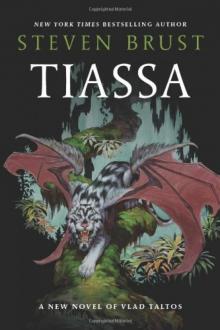 Tiassa
Tiassa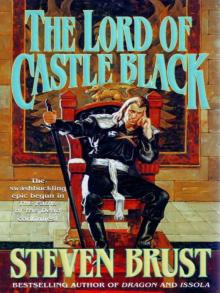 The Lord of Castle Black
The Lord of Castle Black To Reign in Hell: A Novel
To Reign in Hell: A Novel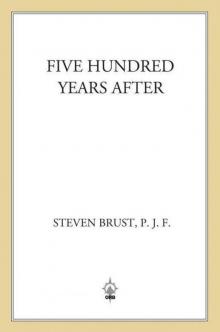 Five Hundred Years After (Phoenix Guards)
Five Hundred Years After (Phoenix Guards)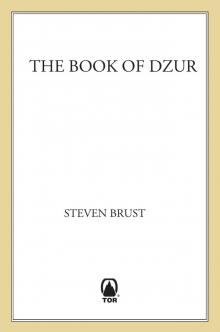 The Book of Dzur: Dzur ; Jhegaala
The Book of Dzur: Dzur ; Jhegaala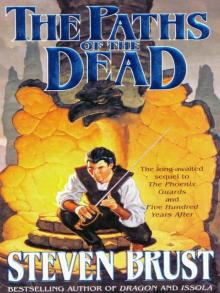 The Paths of the Dead
The Paths of the Dead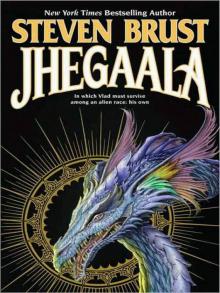 Jhegaala
Jhegaala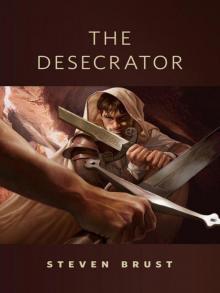 The Desecrator: A Tor.com Original
The Desecrator: A Tor.com Original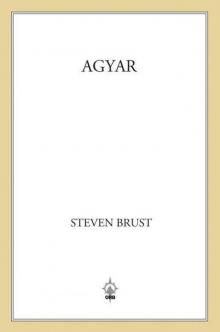 Agyar
Agyar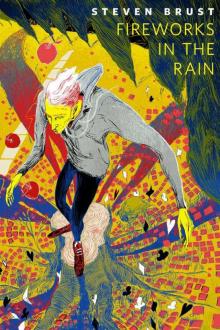 Fireworks in the Rain
Fireworks in the Rain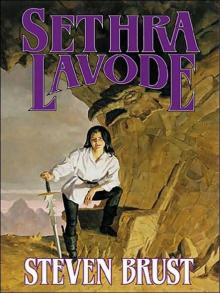 Sethra Lavode
Sethra Lavode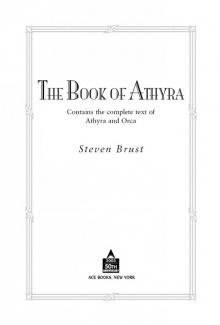 The Book of Athyra
The Book of Athyra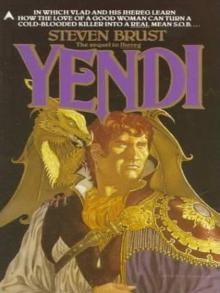 Yendi
Yendi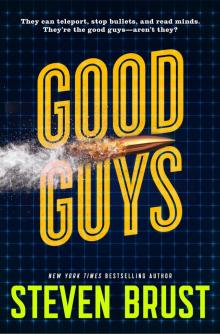 Good Guys
Good Guys The Book of Jhereg
The Book of Jhereg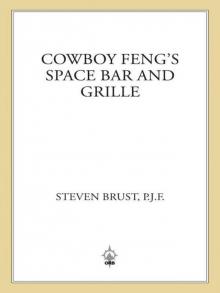 Cowboy Feng's Space Bar and Grille
Cowboy Feng's Space Bar and Grille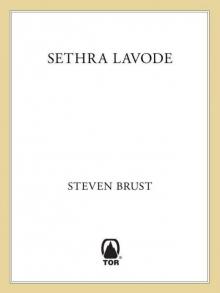 Sethra Lavode (Viscount of Adrilankha)
Sethra Lavode (Viscount of Adrilankha) My Own Kind of Freedom
My Own Kind of Freedom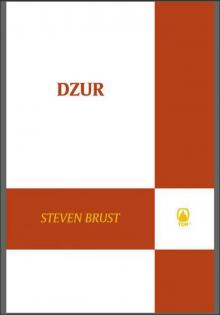 Dzur (Vlad Taltos)
Dzur (Vlad Taltos)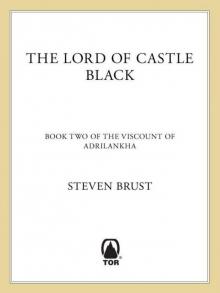 The Lord of Castle Black: Book Two of the Viscount of Adrilankha
The Lord of Castle Black: Book Two of the Viscount of Adrilankha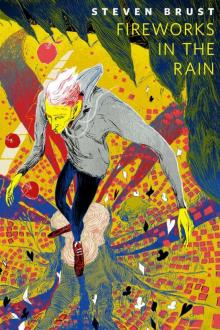 Fireworks in the Rain: A Tor.Com Original
Fireworks in the Rain: A Tor.Com Original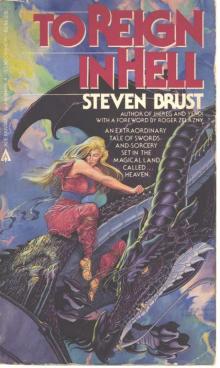 To Reign In Hell
To Reign In Hell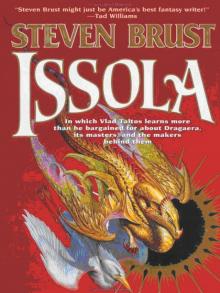 Issola
Issola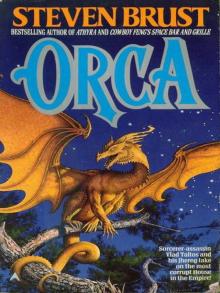 Orca
Orca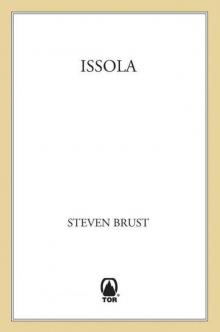 Issola (Vlad Taltos)
Issola (Vlad Taltos)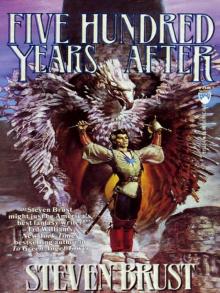 Five Hundred Years After
Five Hundred Years After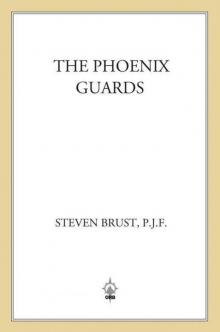 The Phoenix Guards
The Phoenix Guards Taltos
Taltos![[Vlad Taltos 06] Athyra Read online](http://i1.bookreadfree.com/i1/03/24/[vlad_taltos_06]_athyra_preview.jpg) [Vlad Taltos 06] Athyra
[Vlad Taltos 06] Athyra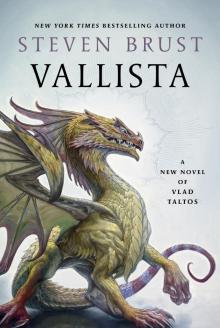 Vallista--A Novel of Vlad Taltos
Vallista--A Novel of Vlad Taltos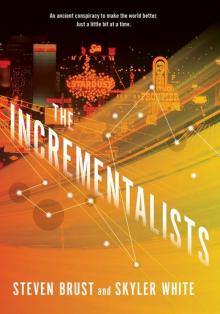 The Incrementalists
The Incrementalists![[Vlad Taltos 04] Taltos Read online](http://i1.bookreadfree.com/i/03/24/[vlad_taltos_04]_taltos_preview.jpg) [Vlad Taltos 04] Taltos
[Vlad Taltos 04] Taltos![[Vlad Taltos 03] Teckla (v 1.1) Read online](http://i1.bookreadfree.com/i1/03/27/[vlad_taltos_03]_teckla_v_1_1_preview.jpg) [Vlad Taltos 03] Teckla (v 1.1)
[Vlad Taltos 03] Teckla (v 1.1) The Book of Taltos
The Book of Taltos The Paths of the Dead (Viscount of Adrilankha)
The Paths of the Dead (Viscount of Adrilankha)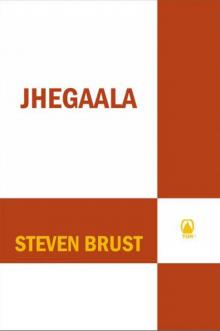 Jhegaala (Vlad Taltos)
Jhegaala (Vlad Taltos)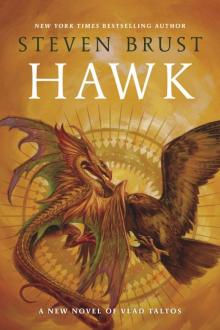 Hawk (Vlad)
Hawk (Vlad)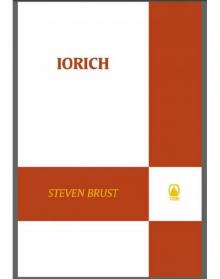 Iorich
Iorich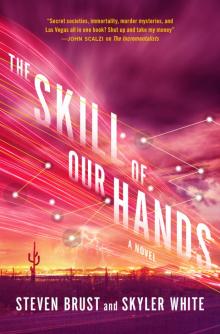 The Skill of Our Hands--A Novel
The Skill of Our Hands--A Novel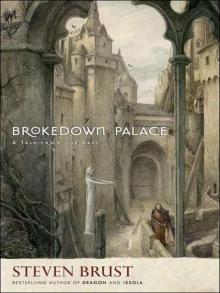 Brokedown Palace
Brokedown Palace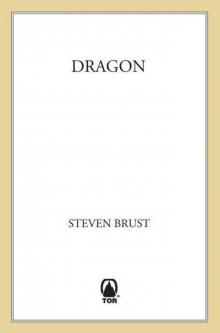 Dragon (Vlad Taltos)
Dragon (Vlad Taltos) Dragon
Dragon Athyra
Athyra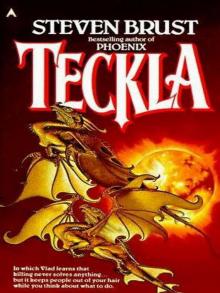 Teckla
Teckla Dzur
Dzur